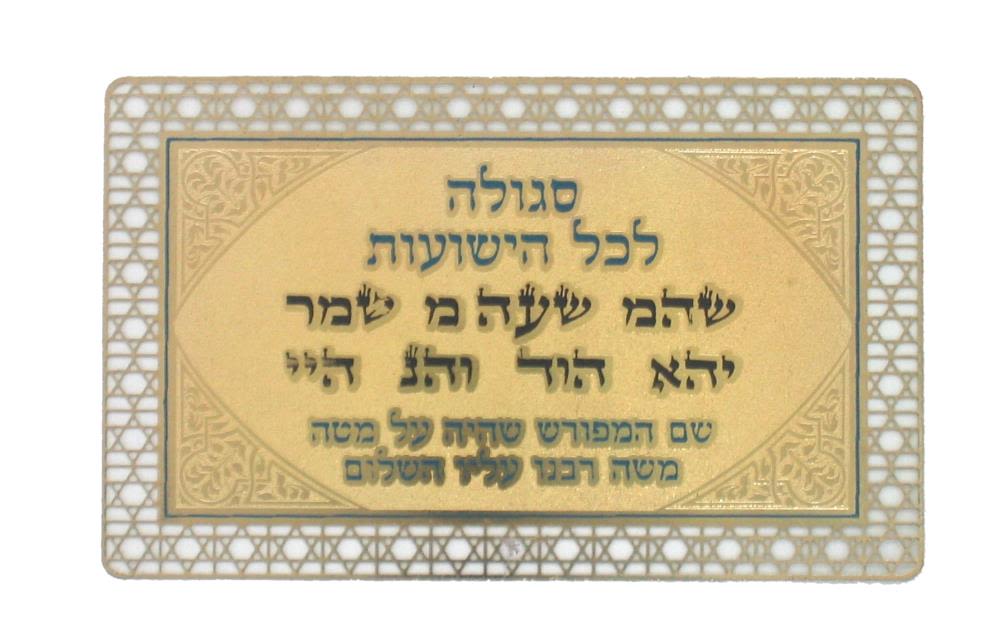
The “Tzetyl Kattan” of the Noam Elimelech
Rabbi Elimelech of Lizensk, also known as the "Noam Elimelech", left us a wonderful gift for posterity – his "Tzetyl Kattan", the small note that helps us get closer to Hashem...

Rabbi Elimelech of Lizensk also known as the Noam Elimelech (Elimelech’s Pleasantness) was a true servant of Hashem. He lived during the years of 1717-1787 and brought the ideas of clinging to our righteous leaders to the forefront of the Chassidic movement.
The Noam Elimelech explains that there are people who serve Hashem textbook style, by adhering to God’s commandments by doing everything according to the law. Although praiseworthy indeed, the Noam Elimelech reveals to us that this path can be devoid of true yearning, feeling and attachment to God. Without the emotional fire to serve God, a person only technically keeps the commandments, and subsequently can develop the mind frame that he will only derive reward or attachment to Hashem after his or her lifetime.
On the other hand the Noam Elimelech teaches that through our efforts a person can already begin to taste the World to Come in their own life. After the marriage canopy, one friend runs up and gives the groom a great big hug and a pat on the back. Yet instead of staying for the dancing and meal he leaves early to attend to his never ending list of “things to do.” On the other hand the second guest stays after the ceremony and helps fill the entire dance floor with people who would normally be on the side or also heading out the exit door. The joy he causes the bride and groom is exponentially greater than the before mentioned guest. Both of the guests fulfilled the mitzvah of rejoicing with the newlyweds. However, if we  take the backward approach with the end result in mind to begin with, what was the intention behind both guests? Where would we fall in to place – with the first or second guest?
take the backward approach with the end result in mind to begin with, what was the intention behind both guests? Where would we fall in to place – with the first or second guest?
To achieve a greater yearning and attachment to Hashem, the Noam Elimelech wrote the Tzetyl Kattan, or “A Small Note” about how to live like the second guest. Many devoted Jews gleam from its intense demands and draw motivation to continue strengthening themselves in their path of holiness. The following is the list which I read in a great book called “Chassidic Masters” by Rabbi Aryeh Kaplan of blessed memory. The following is a concise version of the original list:
1. When you are doing nothing, you can fulfil the commandment of sanctifying God’s name. Imagine that there were a fire burning before you reaching to the heavens. Mentally picture yourself with the courage to pass through the fire to sanctify God’s name. By thinking this at a time when you can’t learn or do other commandments it’s counted as though you fulfilled this commandment, for God counts a good thought as a deed.
2. When you say the Shema imagine that if all the nations of the world were to torture you in the most gruesome way you’d have the capacity to remain vigilant in believing in God’s unity. This is the expected intention according to many sources for the Shema recital and not over-the-board spiritual extra credit.
3. When engaged in various physical pleasures recall the above commandment of sanctifying God’s name. Whereas if you were engaged in the most wonderfully pleasurable moment, you’d gather greater joy giving your life for God then to receive more physical pleasure. (Note: men are advised to read The Garden of Purity to enhance their desire for holiness above the desire for women. The book is a magnificent addition to your library and can change your life for the better.)
4. When doing acts of holiness make it a habit to say “Behold, I am doing this for the sake of the unification of the Blessed Holy One and His Divine Presence, to give pleasure to the Creator, blessed be His name.” As time passes, you will experience great feeling when you say this.
5. Whenever you begin to feel that your negative traits are getting the best of you, say “The Canaante, the Hittite, the Amorite, The Periite, the Hivite, The Yebusite, and the Girgashite.” These seven nations once dwelled in the land of Israel before it was conquered by the Israelites. They represent the seven husks which conceal holiness. By saying them at a time when you are slipping up, you will have divine assistance. In addition, guard your eyes from lewd images and from others possessions. If you encounter a woman, picture God’s name before your eyes. (note: The interested reader is highly recommended to pick up the CD Eyes of Holiness)
6. Don’t have evil or lewd thoughts, maintain a clean brain (see the CD by Rabbi Lazer Brody entitled Clean Brain). If you slip up repeat the verse over and over “And you shall keep yourself from every evil thing.” (Deuteronomy 23:10)
7. Don’t pollute your mind with sexual images, and if you mess up repeat the verse “You shall not stray after your eyes.” (Numbers 15:39) This is also a verse in the Shema.
8. Speak very sparingly only for great necessity. Accustom yourself to say “I do not know.”
9. Wake up enthusiastically! Perform the washing of the hands and know that you are washing away the spirit of evil and impurity. A new start!
10. Make a regular uninterrupted study session immediately upon waking up. Review this outline daily irrespective to what you are learning.
11. Have complete focus in your prayers. Don’t let your mind and vision bounce around. Having focus is the key.
12. To stay strong on the path of becoming a better person at all times, imagine a champion coach before you motivating you at an earsplitting volume to keep all of these disciplines. Doing so will arouse a great awakening from your soul.
13. Find yourself a Rabbi or a good friend that you can share all of your evil thoughts and imaginations that go against the Torah. Don’t omit anything because of shame. This breaks the power of the Evil Inclination from influencing you. In addition you will receive good advice from your friend. This is highly worth it.
14. Review this handbook as often as possible.
15. Eat in holiness to be strong to keep the will of God. That all of the eating is not for physical pleasure but to maintain your body’s health to be the best you can be in living a Torah life. You can also imagine the word for food מאכל which has the numerical value of 91 just like the combination of the Tetragrammaton with the name Adonoy.
16. Overcome your bad habits by acting in the complete opposite for 40 consecutive days. If you are lazy, then act extremely vigilant, etc. In all of your actions act with diligence rather than laxity. When you wake up, or go to work, or when organizing yourself.
17. When you aren’t learning Torah, memorize prayers that you often say and can learn by heart.
Try taking a few of these into your daily routine. Go slowly, some days do one and others apply another. The idea here is that we have some tools for motivation to maintain our closeness to God and to merit living the World to Come in our day to day routine like the second guest.












Tell us what you think!
Thank you for your comment!
It will be published after approval by the Editor.